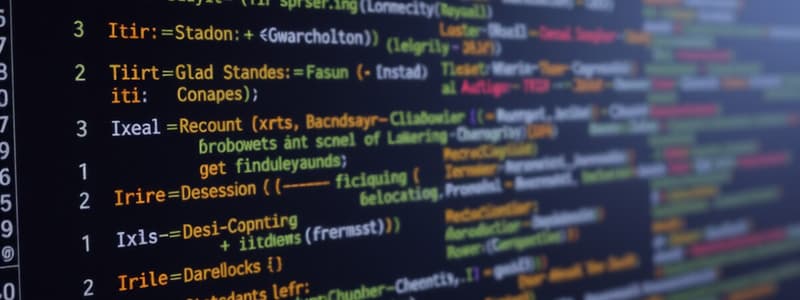Podcast
Questions and Answers
What do query languages allow you to do?
What do query languages allow you to do?
- Manipulation of data
- Retrieval of data
- Both manipulation and retrieval of data (correct)
- None of the above
What are relation instances?
What are relation instances?
The inputs and outputs of a query.
What is a fundamental property of the operators in relational algebra?
What is a fundamental property of the operators in relational algebra?
Every operator accepts relation instances as arguments and returns a relation instance as the result.
What is relational algebra primarily useful for?
What is relational algebra primarily useful for?
How does relational calculus differ from relational algebra?
How does relational calculus differ from relational algebra?
Schemas of input relations for a query are fixed.
Schemas of input relations for a query are fixed.
Since each operation returns a relation, operations can be ___________!
Since each operation returns a relation, operations can be ___________!
What does the selection operator do?
What does the selection operator do?
What can you say about the cardinality of the input and output tables for the selection operator?
What can you say about the cardinality of the input and output tables for the selection operator?
What is the purpose of the projection operator?
What is the purpose of the projection operator?
What can you say about the cardinality of the input and output tables for the projection operator?
What can you say about the cardinality of the input and output tables for the projection operator?
What does the cross-product operator allow us to do?
What does the cross-product operator allow us to do?
What can you say about the cardinality of the input and output tables for the cross-product operator?
What can you say about the cardinality of the input and output tables for the cross-product operator?
What is the renaming operator used for?
What is the renaming operator used for?
The renaming operator is required in all queries.
The renaming operator is required in all queries.
What are tuples in relation 1, but not in relation 2 referred to as?
What are tuples in relation 1, but not in relation 2 referred to as?
What can you say about the cardinality of the input and output tables for the set-difference operator?
What can you say about the cardinality of the input and output tables for the set-difference operator?
What does the union operator do?
What does the union operator do?
What does the intersection operator represent?
What does the intersection operator represent?
What does the join operator do?
What does the join operator do?
What is a condition join?
What is a condition join?
What is an equi-join?
What is an equi-join?
R ________ S is used when we wish to express queries with 'all'.
R ________ S is used when we wish to express queries with 'all'.
Why is the join operation given special attention?
Why is the join operation given special attention?
How can division be defined in terms of basic relational algebra operations?
How can division be defined in terms of basic relational algebra operations?
Why is the division operator not given special treatment in database systems?
Why is the division operator not given special treatment in database systems?
What is a tuple variable?
What is a tuple variable?
How does a relational calculus query 'describe' result tuples?
How does a relational calculus query 'describe' result tuples?
What characterizes the subset of first-order predicate logic in tuple relational calculus?
What characterizes the subset of first-order predicate logic in tuple relational calculus?
What is a domain variable?
What is a domain variable?
What is the difference between tuple relational calculus and domain relational calculus?
What is the difference between tuple relational calculus and domain relational calculus?
What is an unsafe calculus query?
What is an unsafe calculus query?
Relational algebra and relational calculus are said to be equivalent in expressive power.
Relational algebra and relational calculus are said to be equivalent in expressive power.
Flashcards are hidden until you start studying
Study Notes
Query Languages
- Facilitate data manipulation and retrieval from databases.
Relation Instances
- Inputs and outputs of a query within relational databases.
Suitability of Relational Algebra
- Composed of operators that accept relation instances as arguments and return a relation instance.
- Allows complex queries through recursive definitions combining unary and binary operators.
Relational Algebra vs. Relational Calculus
- Relational Algebra: Procedural, operational in representing execution plans.
- Relational Calculus: Nonprocedural, descriptive of the set of answers without explicit computation methods.
Fixed and Composed Operations
- Input and output relation schemas are fixed for queries.
- Operations return relations, enabling composition such that algebra is "closed."
Selection Operator (σ)
- Selects a subset of rows from a relation.
- Input and output table cardinalities remain identical.
Projection Operator (π)
- Eliminates unwanted columns from a relation.
- Output cardinality is less than or equal to input cardinality.
Cross-Product (×)
- Combines two relations resulting in a Cartesian product.
- Output cardinality equals the product of the cardinalities of input relations.
Renaming Operator (ρ)
- Resolves name conflicts in outputs from operations like cross-product.
- Not essential; all operators can derive from Union, Intersection, Set-Difference, and Cross-product.
Set-Difference (-)
- Represents tuples in relation 1 excluding those in relation 2.
- Input and output cardinalities remain identical.
Union (∪)
- Comprises tuples in both relation 1 and relation 2.
Intersection
- Contains only tuples that exist in both relation 1 and relation 2.
Join Operations
- Combines records from multiple tables, with attention due to frequency of use.
- Condition Join: Same schema as cross-product with fewer tuples, also known as theta-join.
- Equi-Join: A subset of condition join emphasizing equality; a Natural Join includes all common fields.
Division Operator
- Expresses queries requiring "all" conditions, e.g., identifying customers with cards at all specified boutiques.
Reason for Join Operation Emphasis
- Joins are common and typically avoid materializing larger intermediate cross-products, leading to efficiency.
Tuple Variable
- Represents tuples defined by a relation schema, maintaining field types and counts.
Relational Calculus Query Structure
- Defined as { T | p(T) }, where T is a tuple variable and p(T) describes T.
Domain Variable
- Ranges over values in an attribute's domain, e.g., integers for integer attributes.
Safety in Relational Calculus
- Unsafe queries (e.g., those seeking infinite sets) must be avoided to ensure manageable results.
Expressive Power Equivalence
- Relational algebra and relational calculus are equivalent; every safe relational calculus query aligns with relational algebra expressions.
- A language is relationally complete if it can express all relational algebra queries and commercial languages may exceed these capabilities.
Studying That Suits You
Use AI to generate personalized quizzes and flashcards to suit your learning preferences.




